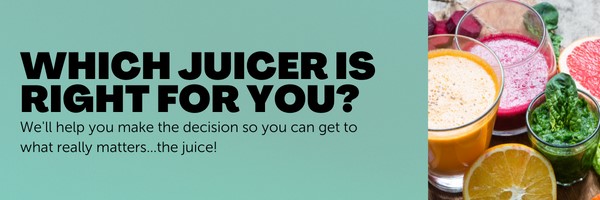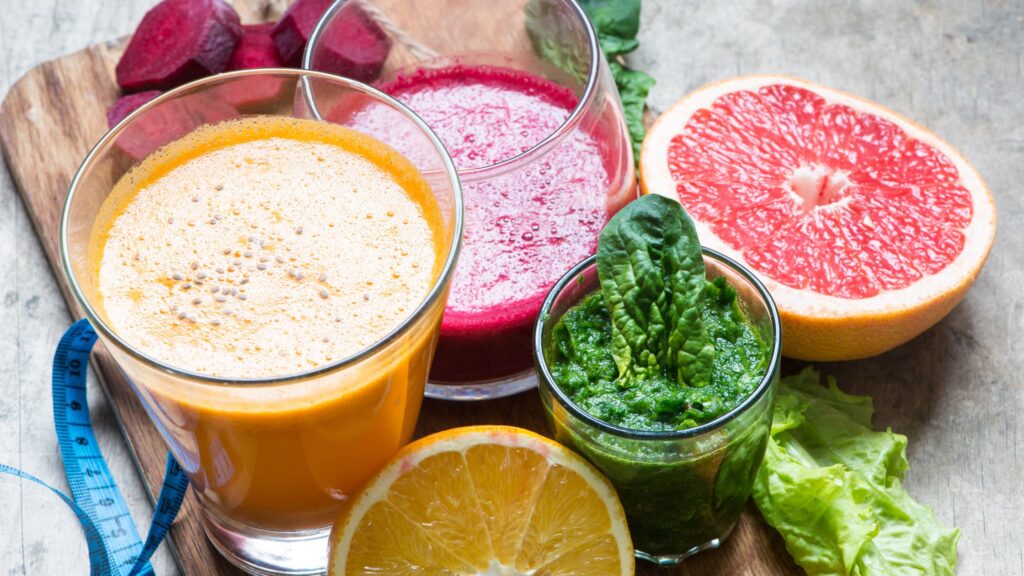You heard about the many benefits of juicing and want to start. But which type of juicer best fits your needs?

To answer this question, you must ask yourself the following questions.
- How much time are you willing to commit to juicing?
- Will your juice be used as a snack or a ritual?
- What’s your budget?
Centrifugal Juicer
Centrifugal juicers are by far the most popular choice….and for good reason. Centrifugal juicers are light, easy to set up and use, and easy to clean with removable dishwasher-safe parts.
Centrifugal juicers grind up fruits and vegetables with a blade on a rapidly spinning basket. The juice is then forced through a fine mesh sieve. This method works quickly but, depending on what your juicing, can produce a lot of foam. There is nothing wrong with the foam. Some people love it and some don’t. Centrifugal juicers work best for juicing carrots, apples, and other hard fruits and vegetables, but still do a decent job on high-fiber leafy greens like wheatgrass and kale.
Centrifugal juicers are speedy but tend to be loud, which isn’t an issue unless you’re juicing early in the morning while others are sleeping. Centrifugal juicers are typically the most affordable.
Pros
- Simple to use
- Fastest way to extract juice from fruits and vegetables
- They take up minimal storage space
- Least expensive type of juicer
- Works great on hard fruits and vegetables
Cons
- Noise level: high
- Does an OK job on wheatgrass and leafy greens
Masticating Juicer
Masticating juicers mimic “chewing” fruits and vegetables, using augers with sharp metal teeth. They then press the maximum amount of juice from the pulp, which results in high yields and very little foaming. This slow juicer technique is best for leafy greens, such as wheatgrass, spinach and kale. Masticating juicers are also known as “cold-press” juicers. Masticating juicers take more time to produce juice but don’t heat it up.
These juicers are often quieter than other types of juicers and operate at a low hum. Their stronger motors come at a higher cost but enable additional features like making nut butters, baby food, sorbets, and even pasta. Masticating juicers are typically more expensive than centrifugal juicers.
Pros
- Yields more juice
- Versatile
Cons
- Slow extraction time
- Higher cost
- Bulky, not easy to store
- Requires more prep work
Triturating/Twin Gear Juicer
Triturating or twin gear juicers appeal to a smaller segment of the juicing market than the other types. These juicers use rotating twin gears to crush and then grind produce into very fine particles. The gears then push the most juice out of the food bits, leaving behind very dry pulp and, like the other juicers, high-quality juice. This type of juicer is particularly great with hearty vegetables and leafy greens, but it can also get a great deal of juice out of soft fruits, too.
Like the masticating juicer, a triturating juicer is much quieter than a centrifugal juicer, however, it has a larger footprint when compared to other types of juicers—most of these machines are horizontal juicers and require much more space on your countertop or in your pantry.
As a trade-off, many of these juicers are also capable of several other great culinary tasks, from grinding seeds and nuts to chopping veggies. If this sounds like the right juicer for you, be prepared to make an investment.
Pros
- Extracts slightly more nutrients from the fruits and vegetables than other juicers
Cons
- Slow extraction time
- Leaves pulp in juice
- Hard to clean
- Takes up a great deal of counter space.
- Expensive
Juice Press/Cold Press Juice
A cold press juicer does an excellent job separating the fiber of fruits and vegetables from the juice. Cold Press Juicers are the most difficult juicer to clean. Cold Press juicers are often the most expensive type of juicer. Given the time to clean and cost, these juicers typically appeal to “hard-core” juicers.
Pros
- Extracts slightly more nutrients from the fruits and vegetables
- Juice oxidizes less and has a longer shelf-life
- 99% of the juice extracted is pure
Cons
- Higher cost
- Hard to clean




